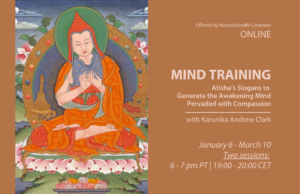I live in an area with beautiful hills all around, filled with nice paths in the woods. I love walking along those many pathways, and every season gives a different taste to the experience.
As the pandemic hit last year, safety restrictions forced me to limit my walks to the hill in front of my place and, as a result, something new happened. Walking the same path daily, I started to get familiar with its many curves, its changes of slope, and now I can almost recognize every tree along the way. It helped me with building a special connection and new way of experiencing that specific area.
I also started reciting mantras while walking around the path that rings the hill, considering it part of my daily meditation practice. Slowly, I began to feel the sacredness of the hill itself and that led me to intentionally practice circumambulations — walking in meditation around a sacred object.
As my sense of connection grew, I began to notice each little piece of plastic left on the path or a Coke can or an empty cigarette box, and I got used to bringing a garbage bag to collect and remove them from the woods. That sounds beautiful, doesn’t it? But here is the trick: I noticed quite quickly that my thoughts about this practice were based on silently looking down on others — the dirty ones, the disrespectful ones, the barbaric ones — who were leaving rubbish in Nature. And, of course, my thoughts were praising me for being the respectful one, the green one, the generous one taking good care of Nature.
When I caught myself in this trap, I realized I was wasting the whole point of the practice: Instead of doing something beneficial, I was only reinforcing my ego-clinging and inflating my pride. So, I tried to change my perspective.
First, I tried to make a mental connection with the people. After all, they were walking the same path as I was, probably trying to get some relief from a difficult situation, very likely worse than mine as I was not experiencing any loss in my family from the pandemic. Chances are, they were looking for some mental relief in the same woods and the same connection with Nature that I was enjoying so much. This helped me to go further: What were they thinking while wandering in the woods, maybe chewing a piece of candy, or smoking a cigarette or drinking some Coke? What were the worries, hopes or fears they were facing as they let the little paper or plastic or can slip from their hands?
That way of seeing them completely changed the flavor of my experience. It was easier to feel closer to those people, and easier to contemplate the interdependent aspect of our lives, thanks to the pieces of evidence they left along the path. They made it possible for me to unfold my “cleaning practice,” which wouldn’t have happened if there were nothing to collect. It even made it possible for me to silently thank them and wish them well.
In the end, they are the ones who so kindly helped me to practice the greenest practice in the world: to do some “mental cleaning” by putting my ego into the garbage bag, one tiny piece at a time.
Practice
Practicing this change of perspective can be very useful in our daily lives. Whether you are waiting in line, stuck in traffic or even waiting your turn for the coronavirus vaccination, pause and look around you. By remembering that other people are struggling with the same fears and the same wishes to be happy and healthy, a sense of connection, even warmth, may spontaneously arise. Who knew that cleaning the woods could bring so much benefit?

Paolo Mazza has been a student of Dzogchen Ponlop Rinpoche since 2018, living in northern Italy. Paolo is a father of three, working in Innovation and Technology. Paolo loves hiking in the mountains and woods of the Alps.






